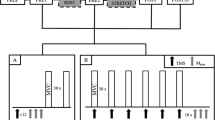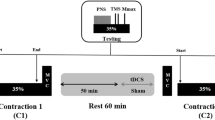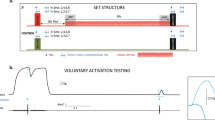Abstract.
Fatigue-associated changes in the excitability of central motor mechanisms were investigated using transcranial magnetic stimulation (TMS) of the motor cortex. Test stimuli were applied before, during and after a voluntary fatigue test of the first dorsal interosseus muscle (FDI). Subjects were required to maintain 50% of their maximum voluntary force (MVC) for at least 2 min (1/2-MVC test) and electromyographic (EMG) reactions of FDI were measured with surface electrodes. Prior to the test, TMS pulses of 70% maximum output (about 1.4 T) produced muscle-evoked potentials (MEPs) of widely different amplitudes in different subjects, ranging from 13% to 55% of the maximum compound action potential (M-wave) evoked by ulnar nerve stimulation. During the test, MEPs of all subjects showed a potentiation; this effect was markedly greater in subjects with a small initial MEP. After the test, the differential degrees of contraction-evoked potentiation still influenced the MEP amplitudes; small pre-test MEPs showed a post-test net potentiation and larger pre-test MEPs showed a net post-test depression. The results underline that the net outcome of motor activation on motor cortex excitability, as studied with TMS, depends on a complex balance of fatiguing and potentiating effects.
Similar content being viewed by others
Author information
Authors and Affiliations
Additional information
Electronic Publication
Rights and permissions
About this article
Cite this article
Zijdewind, I., Zwarts, M. & Kernell, D. Potentiating and fatiguing cortical reactions in a voluntary fatigue test of a human hand muscle. Exp Brain Res 130, 529–532 (2000). https://doi.org/10.1007/s002219900268
Received:
Accepted:
Issue Date:
DOI: https://doi.org/10.1007/s002219900268




